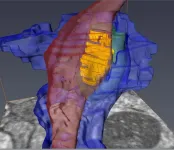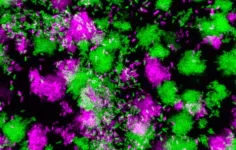(Press-News.org) National economies recover significantly faster from shocks when countries are powered by renewable energy sources, according to new research that has profound implications for global energy policy.
Researchers from Trinity College Dublin looked for patterns in data from 133 systemic economic crises that affected 98 countries over a 40-year span. And while their analyses show that countries relying on a broader range of energy sources experience longer recovery times, the best predictor of economic recovery was the extent to which a country relied on renewable energy.
Underlining the significance of the finding is the fact that while data came from a widely diverse set of societies and their economies the extent of reliance on renewable energy consistently accounted for a major proportion of the variability in economic recovery time.
Ireland (and the 2008 economic crash) was among the countries included in the combined analysis. Currently, the Irish goals for integrating renewables into our energy supply chain include a target to produce 80% of our electricity from renewable sources by 2030.
As such, this work provides strong support for a strengthened national focus on transitioning to a greater reliance on renewable energy.
Ian Donohue, Professor in Environmental Science and Head of Trinity’s School of Natural Sciences, is the lead author of the research, which has just been published Open Access by international journal Ecological Economics. He said:
“Our findings highlight the importance of the intrinsic link between natural resources provided by ecosystems and the stability of the economies that rely on them. Ultimately, they point to the need for a fundamental reassessment of both national and international energy policy, not only for the sake of our environment, but also to enhance the stability—and sustainability—of our economies.
Professor Robert Costanza, Professor of Ecological Economics at the Institute for Global Prosperity at University College London, and co-author of the study, said:
“Although the mechanisms underpinning our results are unclear, one likely explanation is that renewables accelerate recovery because they are locally-produced and not subject to the high volatility of availability and prices connected with fossil fuels.”
Focusing on the situation in Ireland, Professor Donohue said:
“This work provides another compelling reason to double down on our efforts to focus on renewable energy sources such as on- and off-shore wind. Doing so would add a third ‘win’ to what was already a win-win scenario, as a greater reliance on renewable energy will reduce our carbon emissions, help protect our precious biodiversity and now, seemingly, also provide a more resilient economy.”
END
National economies recover faster when countries are powered by renewable energy – new research
2023-06-14
ELSE PRESS RELEASES FROM THIS DATE:
A machine learning approach to freshwater analysis
2023-06-14
From protecting biodiversity to ensuring the safety of drinking water, the biochemical makeup of rivers and streams around the United States is critical for human and environmental welfare. Studies have found that human activity and urbanization are driving salinization (increased salt content) of freshwater sources across the country. In excess, salinity can make water undrinkable, increase the cost of treating water, and harm freshwater fish and wildlife.
Along with the rise in salinity has also been an increase in alkalinity over time, and past research suggests that salinization may enhance alkalinization. But unlike excess salinity, ...
Inflammatory bowel disease linked to increased risk of stroke
2023-06-14
MINNEAPOLIS – People with inflammatory bowel disease (IBD) are more likely to have a stroke than people without the disease, according to a study published in the June 14, 2023, online issue of Neurology®, the medical journal of the American Academy of Neurology. The study does not prove that IBD causes stroke; it only shows an association.
Inflammatory bowel disease causes chronic inflammation of the intestines. It includes Crohn’s disease, ulcerative colitis and unclassified inflammatory bowel disease.
The study found that people with IBD were 13% more likely to have a stroke up to ...
UCF researcher’s innovative approach could redefine allergy treatment
2023-06-14
For years, research and therapies for allergic asthma have been focused largely on targeting the inflammatory cytokines in the body that react to allergens and cause overproduction of mucus, wheezing and difficulty breathing. Commonly prescribed drugs like Omalizumab, Dupilumab, Mepolizumab and Reslizumab lower or block the various cytokines and antibodies responsible for the asthmatic response, but they work after a patient’s airway inflammation is well underway.
Dr. Tigno-Aranjuez wanted to ...
ACSL4: Biomarker, mediator and target in quadruple negative breast cancer
2023-06-14
“ACSL4 has been demonstrated to play a pivotal role in both normal physiology as well as in a variety of disease states, including breast and other cancers.”
BUFFALO, NY- June 14, 2023 – A new review paper was published in Oncotarget's Volume 14 on June 12, 2023, entitled, “ACSL4: biomarker, mediator and target in quadruple negative breast cancer.”
Breast cancer is a heterogeneous disease for which effective treatment depends on correct categorization of its molecular subtype. ...
UTIA researchers find high risk to amphibians if fungal pathogen invades North America
2023-06-14
New research indicates the fungal pathogen Batrachochytrium salamandrivorans (Bsal) could be devastating to amphibian biodiversity if introduced to North America. Nature Communications published the findings June 5 from a group of researchers at the University of Tennessee Institute of Agriculture, the University of Massachusetts-Boston and Washington State University.
“We could see over 80 species of salamanders in the United States and 140 species in North America experience population declines if Bsal is introduced,” said Matt Gray, the lead author and professor of ...
New images capture unseen details of the synapse
2023-06-14
Scientists have created one of the most detailed 3D images of the synapse, the important juncture where neurons communicate with each other through an exchange of chemical signals. These nanometer scale models will help scientists better understand and study neurodegenerative diseases such as Huntington’s disease and schizophrenia.
The new study appears in the journal PNAS and was authored by a team led by Steve Goldman, MD, PhD, co-director of the Center for Translational Neuromedicine at the University of Rochester and the University of Copenhagen. The findings represent a significant technical achievement ...
New UCF project launched to engage a diverse, new generation of researchers to aid aging populations
2023-06-14
ORLANDO, June 14, 2023 — The number of older adults in the U.S. population is growing, expecting to nearly double by 2060, and becoming more diverse with racial and ethnic minority populations projected to increase by 105% by 2040.
“As a society, we’re not ready for that,” says Norma Conner, a professor in the University of Central Florida’s College of Nursing. “We need to be cognizant of the large population of older adults that is going to be ours to care for, and we need to have a better understanding that reflects them.”
To ...
Stanford Medicine and Stanford Institute for Human-Centered Artificial Intelligence announce RAISE-Health, a responsible AI initiative
2023-06-14
Responding to rapid advances in artificial intelligence and the urgent need to define its responsible use in health and medicine, Stanford Medicine and the Stanford Institute for Human-Centered Artificial Intelligence (HAI) today announced the launch of RAISE-Health (Responsible AI for Safe and Equitable Health). This pioneering initiative seeks to address critical ethical and safety issues surrounding AI innovation and help others navigate this complex and evolving field.
Co-led by Stanford School ...
Scientists discover small RNA that regulates bacterial infection
2023-06-14
People with weakened immune systems are at constant risk of infection. Pseudomonas aeruginosa, a common environmental bacterium, can colonize different body parts, such as the lungs, leading to persistent, chronic infections that can last a lifetime – a common occurrence in people with cystic fibrosis.
But the bacteria can sometimes change their behavior and enter the bloodstream, causing chronic localized infections to become acute and potentially fatal. Despite decades of studying the transition in lab environments, how and why the switch happens in humans has remained unknown.
However, researchers ...
Making immunotherapy safer
2023-06-14
Researchers at the University of Houston are working to make T-cell immunotherapy safer, developing a tool called CrossDome, which uses a combination of genetic and biochemical information to predict if T-cell immunotherapies might mistakenly attack healthy cells.
T-cell based immunotherapies hold tremendous potential in the fight against cancer and infectious diseases, thanks to their capacity to specifically target diseased cells, including cancer metastasis. Nevertheless, this potential has been tempered with safety concerns regarding ...





